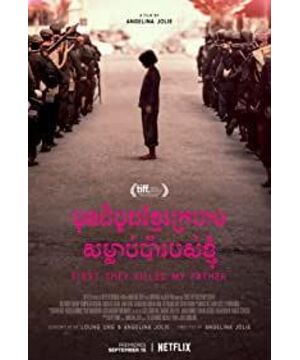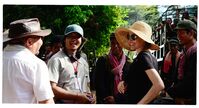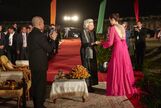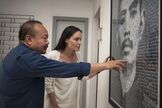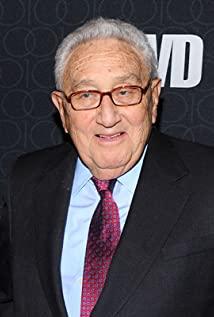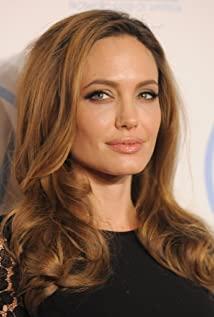2017 is coming to an end, I hope the new year will be less wars and turmoil in the world.
(The article was first published on the public account "Movie Madhouse", WeChat ID: dianyingfengrenyuan)
If those young and frivolous "little pinks" on the Internet really succeeded in overthrowing the original system one day and established an xenophobic regime, what would it be like? The "Khmer Rouge" coup in Cambodia in the 1970s showed us, as posterity, possible outcomes.
And if it does come true, what will happen to the civilian population? Adapted from the memoir of the same name, "They Killed My Father First: Memoirs of a Cambodian Daughter" (hereinafter referred to as "They Killed My Father First"), the film shows the impact of this unrest on the people from the perspective of a child. influence.
I've seen this one of Angelina Jolie's films as a director. I just heard about the films she made before, such as "The Land of Blood and Honey" and "Unbreakable", but I haven't watched them much. But even if I don't know that this is a film directed by Jolie, this "They Killed My Father First" seems to me to be good in terms of content and form. Maybe Julie, as a director, is really on the road.
The background of the film is the "Khmer Rouge" coup in Cambodia, but it only shows what happened to the family of a little Cambodian girl who had lived a carefree life during the coup. This arrangement is based not only on the expositional perspective of the original book, but also on Julie's self-knowledge of her personal ability to write and direct. It is not surprising that Julie, as a transformation director who is not a professional, can't tell stories from multiple perspectives and big patterns. It is a wise choice for her to choose a perspective that is more immersive to the creator herself and the audience as the entry point for the theme. Of course, if the perspective of "seeing the big from the small" is not handled well, the film will easily become subjective, extreme and misleading. I don't know if Jolie's previous films have made such a principled error, but fortunately, this time "They Killed My Father First" did not have any deliberate political stance. The little girl's family brought physical and psychological hardships.
It is also worth mentioning that the photography of the film is not absolutely skilled, but at least it serves the theme of the film in a complementary way. Most of the lens language in the whole film, regardless of the scene, maintains an angle that is almost the same height as the little girl as the protagonist, which is equivalent to showing what the little girl sees and thinks in her heart, and the motif is very prominent; In line with the little girl's perspective, the picture of the film basically doesn't have any dark and cold tones, because the little girl doesn't know that this is a turmoil that is doomed to ruin their family, and she doesn't know whether their next step will be happiness or misery. Since everything is unknown, simply tone does not need any clear characterization. Only a few occasional bird's-eye aerial shots did the audience get a more complete and clearer understanding of what the little girl's environment and situation were like.
I know some people say that this film is not enough to reflect the brutality and evil of the "Khmer Rouge" regime. Of course I understand that, after all, with related documentaries such as "Incomplete Image" and "Don't Think I Forgot: Cambodia's Lost Rock and Roll" that illustrate this history, "They Killed My Father First"'s presentation of history is insignificant. But everyone should know that Pan Lide, the director of "Incomplete Image", is also the producer of the film. Don't he understand the truth? But as a mainstream type of movie, it is best to let everyone feel the same way. Only when the audience resonates, can it be possible to further understand and understand this history. The choice to choose a child's perspective is based on this consideration.
Why describe this history from the perspective of a child? Because the unknowable nature of the coup is particularly evident in the children's impressions. Unless children receive mandatory ideological education, they will not understand any doctrines, beliefs and positions. They only want to play with their parents, brothers and sisters, and children, and of course eat and sleep well. As soon as the war broke out and the turmoil broke out, the children only knew that they would no longer be able to eat delicious food and have fun as before, let alone when they would be able to go home and whether their families would be able to be together. Homeless children are basically willing to do anything, even if someone can give them a home. And when it comes to war, the scene where the little girl and other refugees escaped the war and entered the minefield, really vividly embodies the horror of the war's "self-suffering": among the refugees, no one except the little girl herself knows which part of the wood is in the woods. The landmine was buried, because it was buried with the other "little men" after the little girl was dragged to the Boy Scouts, and her siblings had entered the minefield, and their life and death were unknown. on the torment. However, if the little girl and her siblings did not follow her mother's instructions, escaped incognito from the "labor camp" where people lived and died, and were finally taken in by the Boy Scouts, would she be able to live to this moment? In wars and coups, the "involuntarily" bitterness of civilians is even more unforgettable for children who have no power to bind chickens.
Until now, there are still "little pinks" on social networks who are still taking pleasure in leading wars and xenophobia, but they don't know that the real war is not playing "Jedi Survival". Once a war does break out, you won't necessarily get chicken, but you'll likely be down. 2017 is coming to an end. I can't think of any wish for the time being. I hope that in the new year, the world will have less wars and turmoil. After all, no one can be spared in the face of man-made disasters.
View more about First They Killed My Father reviews


